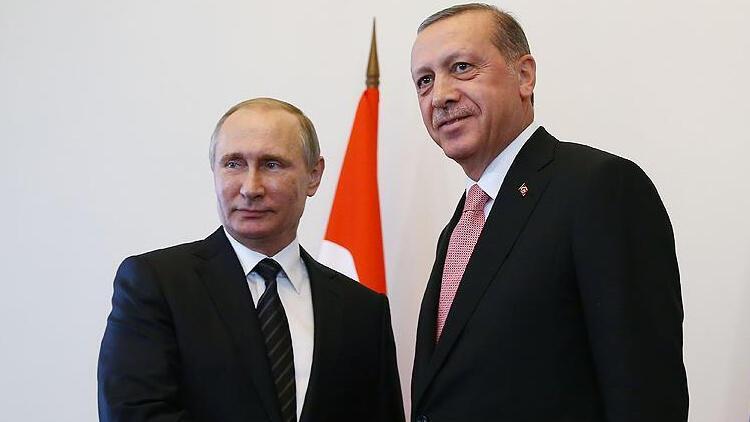Erdoğan-Putin to meet with Idlib, Libya top on their agenda
Sevil Erkuş - ANKARA

President Recep Tayyip Erdoğan and his Russian counterpart Vladimir Putin will meet in Istanbul on Jan. 8 to attend the inauguration ceremony of the TurkStream natural gas pipeline.
The pipeline will transmit Russian natural gas to Turkey and Europe under the Black Sea.
Russian gas producer Gazprom started shipping about 3 billion cubic meters (bcm) of gas to Bulgaria via TurkStream on Jan. 1, replacing a route that formerly passed through Ukraine and Romania.
The pipeline crosses beneath the Black Sea from Russia to Turkey and further extends to Turkey’s borders with neighboring countries. Russia is building TurkStream in two pipelines, each with an annual capacity of 15.75 bcm. The first pipeline is aimed at supplying gas to Turkey, and the second would run further from Bulgaria to Serbia and Hungary.
The TurkStream natural gas pipeline has a total capacity of 31.5 billion cubic meters, out of which the first line will carry a capacity of 15.75 billion cubic meters of Russian gas to Turkish consumers. The second line will carry another 15.75 billion cubic meters of gas to Europe via Turkey.
“Russian gas deliveries, not only for us but also for Greece and North Macedonia, are being carried through the new entry point (at our Turkish border),” Bulgartransgaz CEO Vladimir Malinov told Bulgarian national radio BNR on Jan. 5.
Bulgarian Prime Minister Boyko Borissov, Serbia President Aleksandar Vucic, Azerbaijan Energy Minister Parviz Shahbazov and Hungary Foreign Minister Peter Szijjarto are expected to attend the ceremony.
On Jan. 5, Erdoğan said that he and Putin will discuss TurkStream and regional and other issues.
Erdoğan also said he hoped that Turkey and Russia can help enforce a ceasefire in Idlib of Syria, so no more civilians are hurt by bombs.
There are concerns for Turkey as it has military deployment in the province, a total of 12 army observation posts, as part of a de-escalation deal with Russia. Ankara also fears a massive influx of refugees to its border fleeing the Syrian regime’s intensified attacks on settlement areas in Idlib. In September 2018, Turkey and Russia agreed to turn Idlib into a de-escalation zone in which acts of aggression are expressly prohibited.
On Dec. 19, Russian-backed Syrian forces began a new offensive targeting Idlib province and caused civilians to flee to areas near the Turkish border where they were contained on the Syrian side. Interior Minister Süleyman Soylu on Jan. 7 said more than 300.00 people of Idlib were displaced in one month.
The escalation in Idlib comes at a time when Turkey initiated sending troops to Libya where Ankara and Moscow support the opposite camps. The Turkish troops’ deployment in Libya has already started for a non-combat mission following a deal between Ankara and Tripoli on security and defense cooperation. Turkish Naval Task Group Frigates TCG Göksü and TCG Gökova are also sailing for the port of Algeria to commemorate Turkish seaman and Governor Oruç Reis and thus will be deployed in the east Mediterranean for the upcoming days.
Since the ouster of late leader Gaddafi in 2011, two seats of power have emerged in Libya: Haftar in eastern Libya, supported mainly by Egypt and the United Arab Emirates (UAE), and the GNA in the capital Tripoli.
Russia reportedly has deployed mercenaries to support the military commander Khalifa Haftar, while Turkey backs Libya’s U.N.-recognized Government of National Accord (GNA) headed by Fayez al-Sarraj.
Russia, under the coordination of the United Arab Emirates and Egypt, sent the mercenaries from Syria to Libya to fight in the ranks of Haftar, London-based Arab al-Jadid newspaper reported. Two Russian Air Force aircraft reportedly carrying Russian mercenaries from Syria landed at Benghazi Airport in the last three days.
Despite having contrary interests in Libya, on Jan. 8 the two presidents are likely to discuss an initiative for the resumption of Libyan peace talks.
















